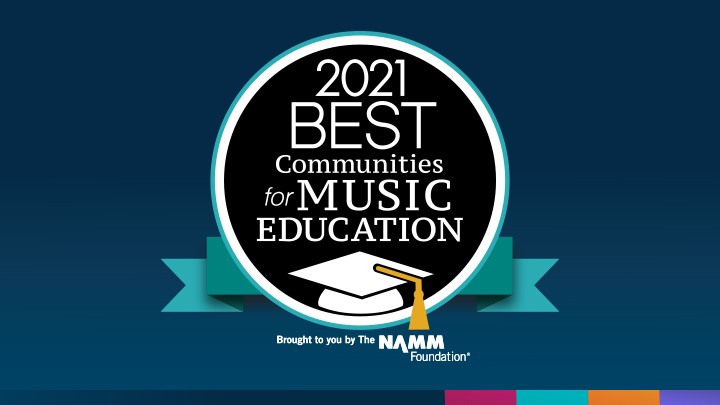While many schools across the nation remain in a state of suspense on reopening to full capacity, and parents and administrators face challenges with distance learning, districts and schools have the opportunity to be recognized for their continued commitment to music education through The National Association of Music Merchants (NAMM) Foundation Best Communities for Music Education (BCME) awards program. Now in its 22nd year, the Best Communities for Music Education (district level) and the SupportMusic Merit Award (school level) offers national recognition and visibility for school music programs and honors the efforts of educators, administrators, students, and community music education champions who share in the common goal to ensure access to music for all students as part of a well-rounded education.
“Through this time of COVID-19 and its impact on school and community, this year’s application process for both the Best Communities for Music Education award for districts and the SupportMusic Merit Award for schools has been modified to meet current realities,” says Mary Luehrsen, executive director of The NAMM Foundation. “It’s our hope that schools, no matter their circumstances, will be part of this national recognition program and be celebrated for ongoing community support for music education.”
Given the impact of COVID on traditional classroom learning, this year’s awards program is designed to celebrate a year of schools and districts innovating in the face of change. Researchers at The Music Research Institute at the University of Kansas, in conjunction with The NAMM Foundation, have created a. new way for districts and schools to share their stories. Using qualitative data to address changes in distance instruction and learning, previous winners of the 2020 Best Communities for Music Education and SupportMusic Awards will be able to use their 2019-20 submission data. For those who are new to the awards program, a new survey will be initiated.
“We wanted to design an opportunity for potential recipients to participate in the 2020-21 Best Communities experience in a way that celebrates the good work they are doing under these remarkable circumstances,” offers the Music Institute at the University of Kansas. “We would not want any school or district to be penalized for lost opportunities due to COVID-19. We believe this year's survey accomplishes just this.”
Over the past two decades, the awards program has served as a catalyst to rally and expand music education programs, as well as to gain additional community support and funding. This year, with COVID-19 initiated changes and revised budget allocations, administrators and instructors continue to underscore the importance of music education for all students.
“Funding amounts may have changed in communities across the nation as student health and safety have needed increased funding due to the global pandemic, but our commitment to music has not,” says Ryan Bulgarelli of Loyalsock Township School District out of Williamsport, Pennsylvania. “Students are in school, receiving in-person instruction five days a week. Ensembles are safely rehearsing following the NAfME guidelines for ensemble rehearsals.”
“Our hybrid schedule limits the students in each class, and as a result, we are able to offer in-person instruction for ensembles,” said Kayla Harris of Metropolitan School District of Lawrence Township in Indiana, a past Best Communities for Music Education recipient. “Our district has provided us with extensive PPE materials to keep our students and staff safe, and our directors are following strict procedures to allow for air exchange, social distancing, and masks on faces and instruments.”
In addition to the Best Communities for Music Education Award given to school districts, the SupportMusic Merit Award, an honor given to individual schools for their efforts to help students realize their full potential through music learning, has recognized hundreds of individual schools over the past seven years.
Since the passage by Congress in 2015 of the Every Student Succeeds Act (ESSA) and a stated emphasis on a well-rounded education, many school districts have re-committed to music and arts education programs. ESSA provides designated funding for well-rounded educational opportunities through Title IV Part A Student Academic Success and Achievement grants. NAMM Foundation research has revealed that these grants are being widely used by school districts to address instructional gaps in access to music and arts education.
In addition to celebrating those schools preserving access to music education, The NAMM Foundation, in collaboration with the National Federation of State High School Associations (NFHS) and the National Association for Music Educators (NAfME) in conjunction with the Centers for Disease Control, issued instrument cleaning guidelines to keep students safe. These guidelines are available here.
Since its inception, over 2,000 schools and school districts have submitted a survey for evaluation. Based on survey responses in 2020, 754 school districts were recognized as Best Communities for Music Education, and 148 schools with the SupportMusic Merit Award. Past districts named a Best Community for Music Education included urban, suburban, and rural districts. Schools that have received the SupportMusic Merit Award designation included both public and private schools and range from elementary to middle and high schools.
District officials, music educators, and school staff in the domestic United States are invited to complete the survey by Feb 7, 2021, here.
In conducting the annual survey, The NAMM Foundation and the survey designers are also joined by advisory organizations in the fields of music and education, including Americans for the Arts; League of American Orchestras; Mr. Holland's Opus Foundation; Music for All; Music Teachers National Association; National Guild For Community Arts Education; Yamaha Corporation of America; Young Audiences; and Save The Music Foundation.

